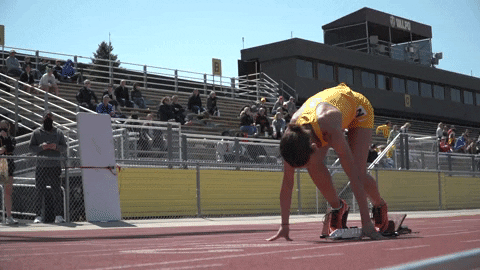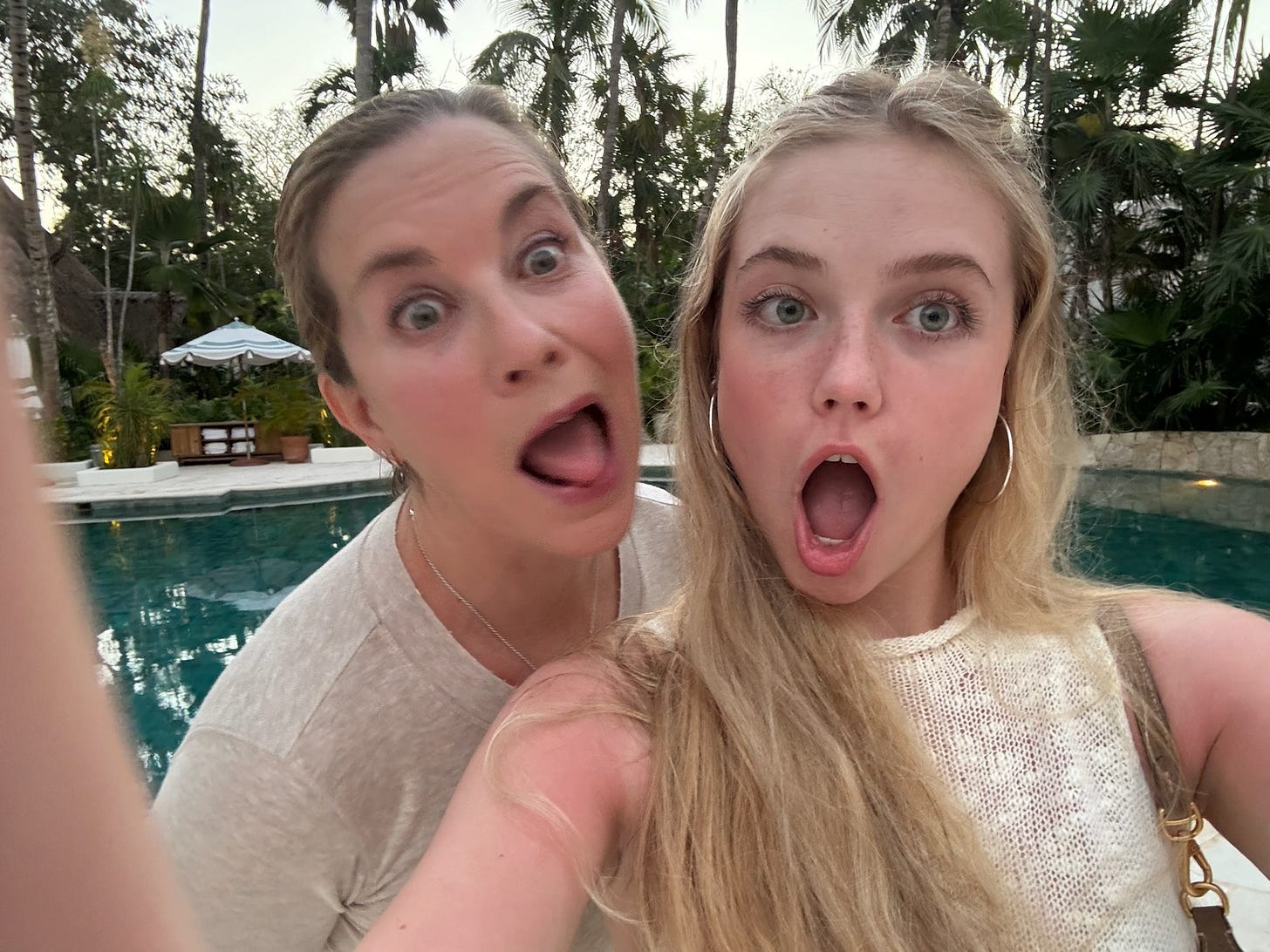#130: Hope is not a spectator sport.
The surprising muscle behind what I once dismissed as passive and naive.
The Luminist is a reader-supported publication that illuminates the pain, the pleasure, and the paradox on the path to technicolor living. Subscribe below to receive posts about how loss teaches us to get the most out of life (along with silly gifs) in your inbox every Saturday.
I used to be anti-hope.
Not just skeptical — actively opposed to the very concept. Hope was for people who lacked discipline. People who couldn't take control of their circumstances. People who preferred wishful thinking to actual action.
As a corporate executive with a strategic plan for everything — from my career trajectory to my kids’ college applications — I relied on analysis, preparation, and sheer determination. In comparison, hope seemed like a pastel-colored consolation prize for those who weren’t willing to put in the work. It sounded nice but had no substance — a concept paraded around as if it could save us all, without any clear mechanism for how. What were the five actionable steps hope was going to use? What measurable outcomes could it produce?
It just gave us an excuse to sit back and “hope for the best” — a wallflower waiting to be asked to dance while the doers were already on the floor boogieing their hearts out.
From my vantage point, the Emperor of Hope had no clothes.
But while working on my book Do Loss, I started wondering if I had hope all wrong. Then an article from one of my favorite Financial Times columnists, Jemima Kelly, confirmed my ass-backwardness.
I love Kelly because she's a self-described skeptic and contrarian. My kind of woman. But this column's title?
"It's the hope that saves you."
My sassy columnist crush was sincere to the bone.
And damn if she wasn't right.
Hope is often "conflated with optimism, but there are some important distinctions," Kelly explains.
These distinctions matter.
"Optimism is an expectation of a positive future. Hope is a habit of focusing action and attention on a future that is good and that is difficult but yet possible to attain," Kelly quotes Edward Brooks, executive director of the Oxford Character Project, as saying.
In other words, hope isn't the passive waiting I've judged it as for years. Hope is the birthplace of action. Because you hope, you take steps forward.
I’m just going to continue to quote Kelly, because she explains it so well…
“Optimism — while it brings health and happiness benefits of its own, and tends to be more motivating than pessimism when used in messaging — is a much more passive thing; some people seem to be born with it and others without. Hoping is a choice to focus on the possibility, however faint, of some future good, and crucially involves individual and collective agency. Hope carries with it the conviction that we can take action that makes our desired future more likely.”
So according to Brooks and Kelly, optimism sits on the passive end of the spectrum — a general sunny outlook.
But hope? Hope has muscle to it. It demands something of us.
Because hope is as an orientation of our entire selves — a way of directing our attention, energy, and action toward possibility even when circumstances seem hopeless. It’s not about denying reality — it’s about choosing how we will move forward from here.
I ended up writing an entire section in Do Loss around this understanding of hope, which I’ve come to call ‘actionable hope’.
Because I'm still a strategic thinker to my core, I find it helpful to break down this concept into three essential elements. That way when the imperative "Hope!" feels too abstract, you can find your way back to this empowered mindset, one factor at a time.
1. Openness to possibility
After Mike died, possibility was the last thing on my mind. The future I had imagined — growing old together, sharing grandchildren, traveling the world once the kids were launched — had vanished. All I could see was a blank wall where those dreams had been.
But slowly, I began to notice tiny cracks in that wall: moments of unexpected connection, glimpses of beauty that caught me off guard, flashes of joy that I couldn’t have predicted. These weren’t signs that my grief was “ending” (it never truly does), but rather that life was continuing to unfold in ways I couldn’t have anticipated.
Hope isn’t about bypassing any pain we’re feeling. It’s about remembering that just because things are bleak now doesn’t mean they will stay bleak. Your life may never be the same, your heart may be a nuclear fallout zone, but the possibility of something good coming over the horizon remains.
2. Belief in our capacity to persevere and heal
A reader from South Korea wrote to Kelly after her article was published, sharing how the piece had affected him during an unimaginably difficult time. His wife had suffered a traumatic brain injury in a serious accident, leading to emergency surgeries and intensive care. In the midst of this terrible uncertainty, he found that Kelly’s words “felt like a shaft of light breaking into that darkness.”
What struck me about his letter wasn't just the circumstances he faced, but his recognition that hope was "not a naive indulgence but a virtue, a form of courage."
Let that sink in.
Even without guarantees — perhaps especially without guarantees — he chose to believe in their capacity to come out the other side of that life-altering challenge. He didn’t give up. He kept going.
You might call it delusional, but I call it essential. Because at some point in your life, things will feel hopeless. I hate to break it to you, but despair is on the "guaranteed list" alongside death and taxes. And the only way through those times is to choose to stubbornly, consistently believe anyway.
So we maintain the conviction that:
we have the strength to endure what feels unbearable
we have the miraculous ability to heal from what seems permanent
no matter how long it takes, we will find our way through the impossible
3. Active participation in our way forward
The final and perhaps most crucial element of actionable hope is that it requires our participation. The future we dream of is not something we wait for, it’s something we help to create.
In those early days of widowhood, I often felt like I was simply waiting for time to pass, for the pain to lessen, for some mysterious healing process to work its subconscious magic while consciously I just trudged through day after day. But I gradually realized that healing wasn't happening to me — I was actively engaged in it, whether I recognized it or not.
Every time I reached out to a friend instead of isolating, every time I allowed myself to feel the full force of grief instead of numbing it, every time I tried something new despite the voice inside that said "what's the point?", I was participating in my own healing.
As Kelly points out, hope "involves individual and collective agency." It carries the conviction that our actions make a difference — that we can do things today that make our desired future more likely, even if it's months or years away.
Years after Mike’s death, I found myself facing entirely different losses — which is how life goes. Loss doesn’t retire after one big performance. It keeps showing up in different costumes throughout our lives.
When my daughter left for college, I became an empty-nester. I walked into her newly spotless bedroom and felt my chest tighten. Not the same as death, not even close, but still — something precious had changed forever. The house echoed. My calendar gaped with unfilled hours. My identity as hands-on mom vanished overnight.
But instead of white-knuckling through it or pretending I was "just fine" (my old playbook), I leaned into actionable hope. I acknowledged the reality: yes, this hurts. And I simultaneously chose to believe that I could survive this transition and discover something lovely on the other side. So after dropping Kendall off at Tulane, I embarked on my "Empty Nester World Tour." I spent two weeks traveling, seeing beloved family, and exploring what my next chapter might look like. When I returned home, the ache was still there, but it was accompanied by a sense of agency and possibility.
When I wrapped up my corporate career after 30+ years, another kind of loss hit. I didn't just miss the paycheck or the purpose, though both mattered, but the entire ecosystem that had structured my days for decades. My work family, my travel schedule, even my professional identity — gone. Several friends warned me about the "retirement blues," assuming I'd need a wine subscription to carry me through the inevitable lows.
But actionable hope works no matter what you’re grieving, what is shifting and changing. I honored what I missed while actively building a writer's life. I believed I could create something meaningful even without knowing exactly what that would look like. I experimented rather than expected perfection.
Most of us resist hope after loss, afraid it makes us naive or sets us up for more disappointment.
The opposite is true.
Hope isn’t wishful thinking — it’s the engine that powers everything that comes next. It’s what gets us out of bed when gravity has doubled. It’s what helps us experiment when certainty has vanished. Without it, we’re left with only forlorn endurance, only somber survival.
With it? We become architects of our own transformation.
Life still brings storms. Days of darkness. Moments when I doubt everything I believe about growth and healing. But I've found that actionable hope isn't about feeling hopeful all the time—it's about continuing to choose possibility, belief in our capacity to heal, and taking baby steps toward a brighter future, even when we're pretty sure it's pointless.
So now, for me, hope has been reborn.
Now I see that being hopeful is not naive or passive, it's dauntless.
Choosing to believe,
P.S. This post includes excerpts from my upcoming book, Do Loss. You can pre-order your copy today.












Hebrews 11:1 , !
For me, hope is intertwined with faith!